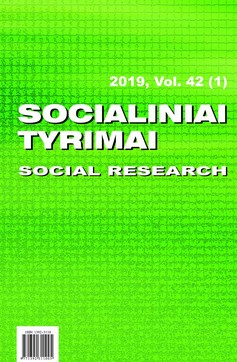Teoriniai ir empiriniai suinteresuotųjų šalių dalyvavimo raiškos miesto prekės ženklo vystymo veiklose aspektai
Theoretical and empirical aspects of the manifestation of stakeholder participation in city brand development activities
Author(s): Lina Bivainienė, Teodoras TamošiūnasSubject(s): Rural and urban sociology, Marketing / Advertising
Published by: Vilniaus Universiteto Leidykla
Keywords: city brand; stakeholder; participation; development;
Summary/Abstract: Relevance and problem of the research. The development of city brand is understood as the process when the city becomes a product that can be attractively “sold”. City marketing has evolved into marketing activities that focus not only on the formation of marketing complex or market research, but also on the stakeholder involvement in order to achieve strategic goals. The scientific literature analyses stakeholder participation in different activities by deepening into the expectations or results of one or another stakeholder, the problem of city brand development as well as discusses the concept of city brand or identifies the elements of city brand. However, there is a lack of a systematic approach in modelling the prerequisites necessary for stakeholder participation, the conditions of expression, and the identification of directions in the development of city brand. Therefore, the manifestation of stakeholder participation in the development of city brand is a relevant, but at the same time, problematic subject for research, both theoretically and practically. The scientific problem can be summarized as the following question: What is the manifestation of stakeholder participation in the development of city brand in the context of Lithuania? The aim of the study is after theoretical and empirical investigation of the manifestation of stakeholder participation in the development of city brand to provide a model of the expression of stakeholder involvement in the development of city brand. Research methods. Three research methods were applied in empirical research: 1) the case study method examined all eight existing and approved Lithuanian city branding guides; 2) the method of content analysis of the documents analysed the participation of stakeholders in the development of city brand in the strategic development plans of 60 municipalities and investigated the components of the development of city brand in these plans; 3) The method of expert semi-structured interviews investigated the attitudes of fifteen city brand professionals about the manifestation of stakeholder participation in the development of city brand. Participation is a broad concept where economic, social, cultural and psychological aspects overlap. Scientists also identify different forms of the manifestation of participation. Since the end of the 20th century, there has been a tendency towards increasing participation of stakeholders in various public activities, development projects, and development of the city in which they live or have interests. Stakeholder participation aims to balance different interests, to agree on an overall result, and to achieve rationality. Stakeholder participation in the development of city brand can be seen as a whole, as a subject of consensus. The summarized analysis of scientific literature allowed to identify six elements of city brand and 20 of their characteristics. The six elements were paired and grouped into three groups: tangible (location, infrastructure and public services), non-tangible (urban life, people) and illustrating achievements (potential, status and position) elements of city brand. The results of empirical research enabled to supplement these elements with four additional characteristics and to concretize them with the cases of Lithuanian cities.
Journal: Socialiniai tyrimai
- Issue Year: 42/2019
- Issue No: 1
- Page Range: 5-18
- Page Count: 14
- Language: Lithuanian

